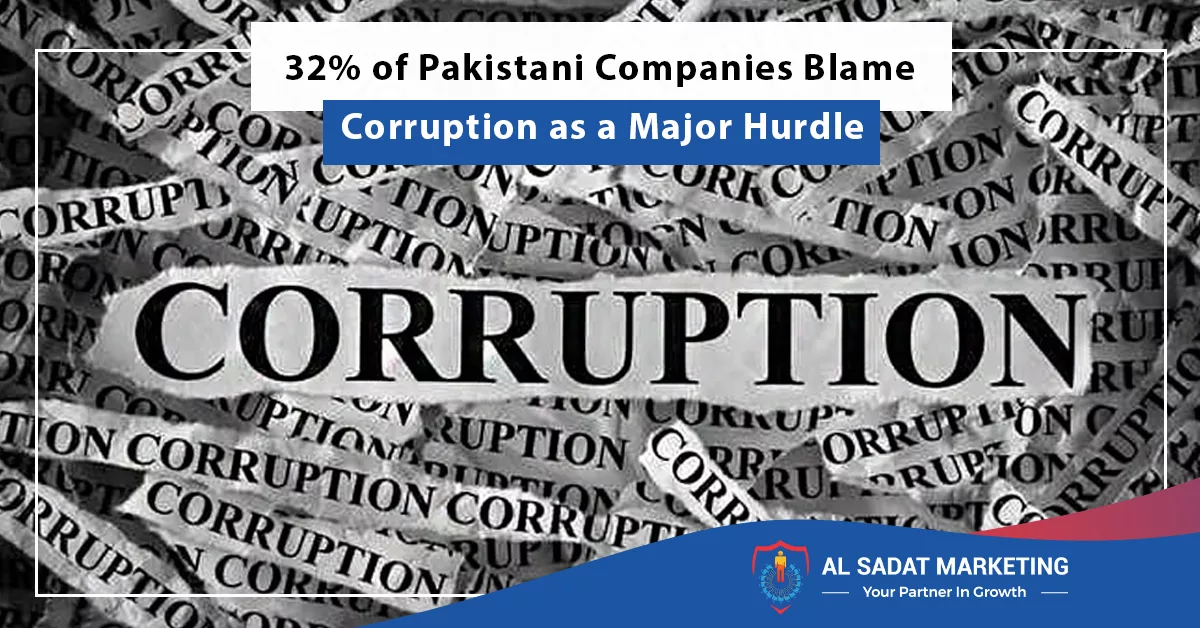Corruption is cited by 32% of Pakistani businesses as a key barrier to doing business. This is higher than both the global average of 29 percent and the average for South Asia, which is 28 percent.
According to Gallup Pakistan’s research, “Corruption – World Bank Enterprise Survey 2022,” restrictions like corruption, which are prevalent in Pakistan compared to other parts of the world, might limit chances for new entrants into the market and increase operational expenses in general.
In Pakistan, the percentage of businesses that have received at least one request for a bribe payment has drastically decreased over the past few years, falling to 16 percent in 2022 from 31 percent in 2013 and 60 percent in 2007.
Read More: Fraud Worth Over 200 Mn Exposed in Punjab Property Tax Record
A significant decrease from 68 percent in 2013 and 59 percent in 2007, roughly 32% of Pakistani businesses in 2022 regarded corruption as a key impediment. This can be the result of politicians appropriating enterprises or other growing global commercial restraints.
This can indicate a shift in the attitudes and actions of those who offer and accept bribes. In Pakistan, 16 percent of businesses report receiving at least one bribe request, which is less than the South Asian and global averages of 21 and 16 percent, respectively. These modifications may take place if the nature of the conduits for payments or gifts has changed, or if governments are stricter in their oversight of commercial activity.
The court system was cited as a significant business barrier by 11% of the companies that were polled. According to estimates, courts are a major business restriction for 15% of businesses worldwide and 14% of businesses in South Asia.
When businesses are unable to get prompt and impartial court judgements, corruption can worsen its impacts and make conducting business more difficult overall.
To boost their chances of survival and guarantee that the services offered by such officials are maintained, businesses might be less reluctant to reveal incidents of bribery. These actions can result in unanticipated delays, an increase in costs, and make it more difficult for people to enter the market who are uninformed of industry practises.
Prevalence of Corrupt Practices
In Pakistan, 22% of businesses claim to have given presents to officials to “get things done”. This is less than both the global average of 19% and the average for South Asia of 24%.
Despite variations, corruption is frequently found in Pakistan’s many businesses as a technique to obtain water and electrical connections (57 percent and 81 percent, respectively), as well as import and export licences (20 percent). This is especially accurate for the manufacturing sector.
In Pakistan, 59 percent of the businesses are required to provide donations in order to obtain building licences. While barely 20% of businesses worldwide and only 37% of businesses in South Asia are anticipated to pay. When paired with other expenditures like those associated with expected gifts for tax authorities, government contracts, and other bureaucratic procedures, this results in further increases in the costs for businesses that wish to grow and a decrease in the desire of investors to participate in firms.
Despite having broad authority, execution agencies like the National Accountability Bureau (NAB) are not doing enough to address the problem of common corruption practises that business owners face.
Additionally, several companies have been seen using similar techniques while neglecting to pay their taxes in accordance with the rules. This might affect their desire to stop engaging in these activities and might have advantages like lower tax obligations and less regulation and oversight of their operations.
According to the aforementioned graph, the percentage of companies expected to pay for gifts in exchange for contracts has varied significantly over the last 15 years. In 2007, 30% of companies were anticipated to pay, while 88 percent of companies did so in 2013 and only 16% of companies are anticipated to pay in 2022. It is important to investigate this considerable decline because it might indicate a change for the better in how government officials and business performance are related.
When businesses are involved in activities that need the payment of taxes and in order to obtain government contracts, there may be a high prevalence of practises of accepting and donating presents to officials. According to the survey, this lessens the chance for growth for smaller businesses and the willingness of investors who cannot conduct business in the presence of unofficial barriers.
Corruption in Different Sectors
As was said above, 32% of Pakistani businesses consider corruption to be a significant barrier to doing business. Depending on the sectors and industries, these numbers may change. In Pakistan, roughly 16% of businesses in the manufacturing and service industries have admitted to getting at least one request for bribe money.
Even within a single industry, trends can differ. For example, enterprises in South Asia reported a little higher rate of 22% while those in other regions of the world reported a somewhat lower rate of 15%.
49 percent of businesses in the automotive and transportation equipment sector, 37 percent of businesses in the chemical products sector, and 22 percent of businesses in the textile sector, namely in the manufacturing industry, report getting at least one bribe request.
These requests may vary depending on the nature of the business, its size, and the number of licences and government approvals required for it to exist, such as the significant government backing needed for chemical manufacturing companies to operate. Similar to this, in order to function on a large scale, auto manufacturers need extensive approvals and ongoing support.
These sectors may be encouraging government officials to abuse their positions because they require continual and frequent approvals in order to operate.
Similar to this, 28% of businesses in the services industry cite corruption as a significant obstacle. Corruption is seen as a serious limitation by 27% of retail businesses, 21% of hotels and restaurants, and 33% of businesses that offer other services. It is evident from a comparison to the manufacturing sector that the nature of the firm and business has an impact on how pervasive unethical practises are.
The paper claims that businesses in the informal sector may not encounter these difficulties to the same extent as those in other industries, which makes them less likely to interact with government representatives and less likely to expand in ways that necessitate significant government assistance.
You can also invest in other famous and most in demand housing societies, such as , Blue World City, Rudn Enclave, 7 Wonders City Peshawar, Taj Residencia, Kingdom Valley, New Metro City Gujar Khan, Forest Town Rawalpindi, University Town Rawalpindi, ICHS Town, Park View City Islamabad, Multi Gardens B17 Islamabad and Nova City Islamabad.
Al Sadat Marketing please contact 0331 1110005 or visit https://alsadatmarketing.com/
Few more real estate housing schemes which are trending now a days in Islamabad by including: Faisal Town Phase 2, Prism Town Gujar Khan, New City Paradise, Eighteen Islamabad, 7 Wonders City Islamabad, Capital Smart City, Silver City Islamabad, The Life Residencia, Faisal Town Islamabad, Islamabad Golf City, Islamabad Model Town and Marble Arch Enclave.
Al Sadat Marketing is an emerging Real Estate Agency headquartered in Islamabad, Pakistan. With over 10+ Years of experience, Al Sadat Marketing is providing its services and dealing all trending housing societies projects in different cities of Pakistan. Islamabad Projects, Rawalpindi Projects, Gujar Khan Projects, Burhan Projects, and Peshawar Projects etc.
Book Your Plot Now: +92 331 111 0005










